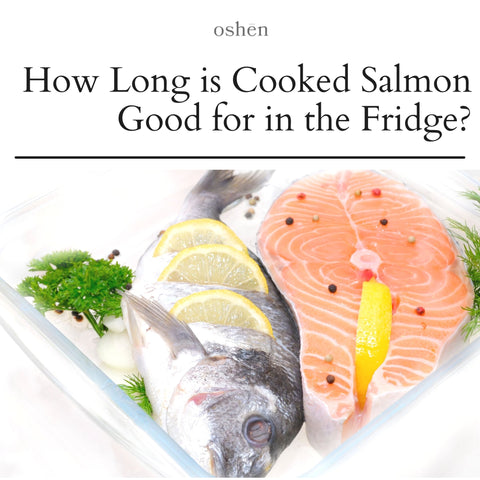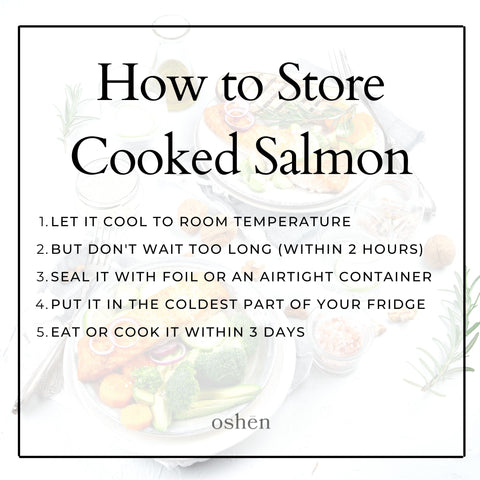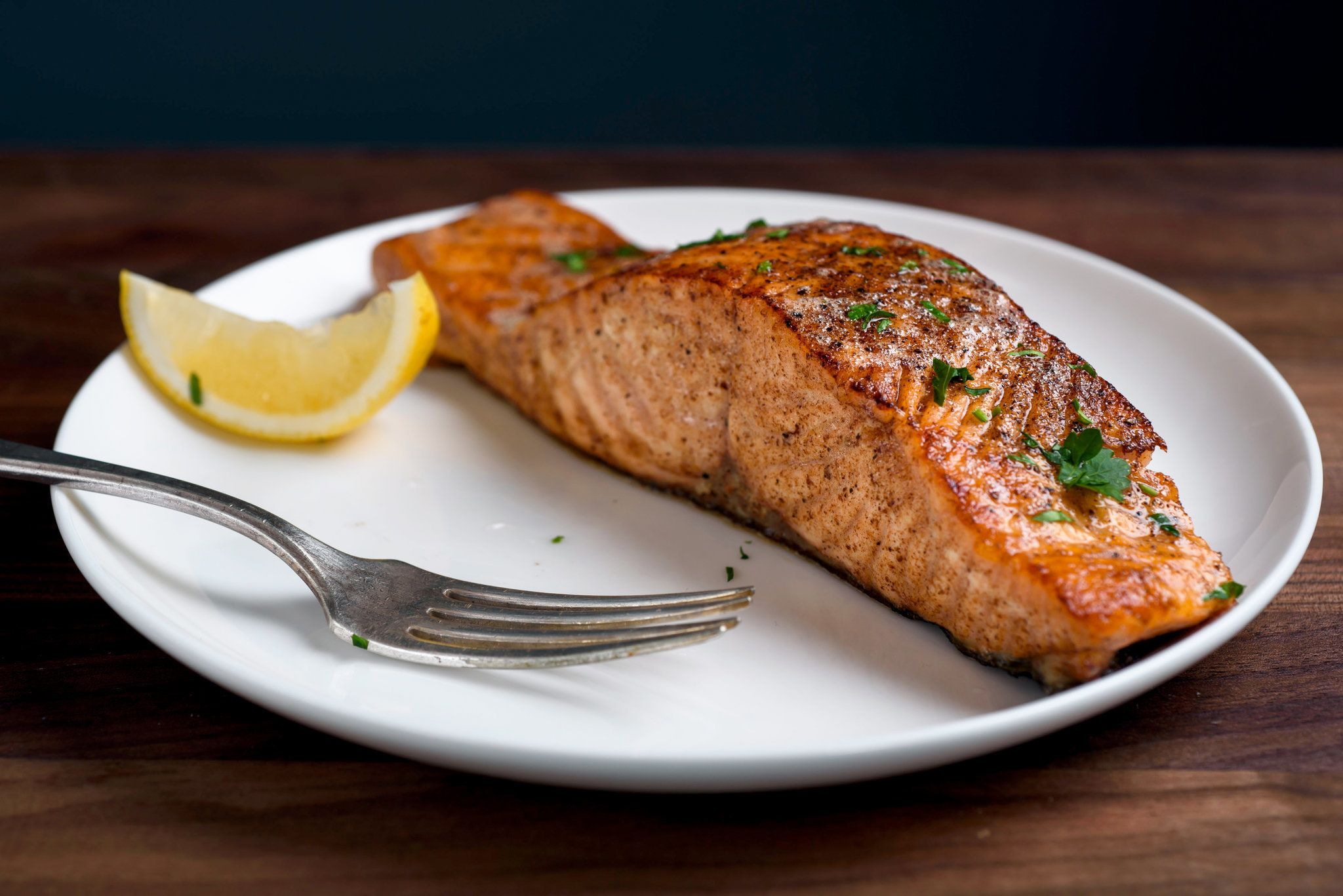
Introduction
Cooked salmon is a popular choice for a healthy and delicious meal. It is packed with nutrients, such as omega-3 fatty acids, and is known for its delicate flavor. However, like any other perishable food, cooked salmon has a limited shelf life. Understanding the factors that can influence its freshness and following proper storage guidelines are essential to maximize its shelf life without compromising taste or safety.
The Importance Of Storing Cooked Salmon Properly
Proper storage is crucial to maintain the quality of cooked salmon and prevent bacterial growth. Storing it at the correct temperature and following recommended guidelines will help preserve its flavor and texture.
Factors That Affect The Shelf Life Of Cooked Salmon
- Quality of the salmon: The freshness and quality of the salmon before cooking can significantly impact its shelf life. High-quality, fresh salmon will generally last longer compared to salmon that is already close to its expiration date.
- Storage temperature: Cooked salmon should be stored at a temperature below 40°F (4°C). Bacteria grow rapidly between 40°F and 140°F (4°C and 60°C), so refrigeration is essential to inhibit their growth and maintain freshness.
- Storage duration: Cooked salmon should be consumed within three to four days of cooking. As time passes, the quality and flavor may diminish, and the risk of bacterial contamination increases.
- Storage conditions: Proper storage conditions include placing the cooked salmon in an airtight container or wrapping it tightly with plastic wrap to prevent air exposure and moisture loss.
In conclusion, understanding the factors that affect the shelf life of cooked salmon and following proper storage guidelines are key to preserving its freshness and safety. By considering the quality of the salmon, storage temperature, duration, and conditions, you can enjoy your cooked salmon for as long as possible without compromising its taste.
Understanding The Shelf Life Of Cooked Salmon
Cooked salmon is a popular choice for a healthy and delicious meal. It is packed with nutrients, such as omega-3 fatty acids, and is known for its delicate flavor. However, like any other perishable food, cooked salmon has a limited shelf life. Understanding the factors that can influence its freshness and following proper storage guidelines are essential to maximize its shelf life without compromising taste or safety.
The Recommended Storage Period For Cooked Salmon
- Cooked salmon should be consumed within three to four days of cooking. As time passes, the quality and flavor may diminish, and the risk of bacterial contamination increases.
- Storing cooked salmon in an airtight container or wrapping it tightly with plastic wrap can help extend its freshness.
- It is essential to store cooked salmon in the refrigerator at a temperature below 40°F (4°C) to inhibit bacterial growth and maintain its quality.
- Freezing cooked salmon can further extend its shelf life. It can be stored in the freezer for up to three months.
How To Tell If Cooked Salmon Has Gone Bad
- Check for any signs of spoilage, such as a strong odor, slimy texture, or discoloration.
- If the cooked salmon feels mushy or develops a sour or off-flavor, it is best to discard it.
- Beware of any signs of mold growth on the cooked salmon, which indicates contamination and spoilage.
Proper storage and timely consumption of cooked salmon are crucial to ensure its freshness and safety. By following the recommended guidelines, you can enjoy your cooked salmon for as long as possible without compromising its taste or risking foodborne illnesses.
Tips For Maximizing Salmon Freshness
Properly Cooling Cooked Salmon Before Storage
- It is crucial to properly cool cooked salmon before storing it. Leaving it at room temperature for too long can promote bacterial growth and reduce its shelf life.- After cooking, allow the salmon to cool to room temperature for about 30 minutes.- Once cooled, place the salmon in the refrigerator within two hours to prevent spoilage and maintain freshness.- Avoid placing hot salmon directly in the refrigerator, as it can raise the internal temperature and affect the quality.
Choosing The Right Storage Container For Cooked Salmon
- To maximize the shelf life of cooked salmon, store it in an airtight container or wrap it tightly with plastic wrap.- The airtight container or plastic wrap helps to protect the salmon from moisture and odors in the fridge, maintaining its quality and preventing it from drying out.- Consider using individual portions or dividing the cooked salmon into smaller portions that are easier to store and consume.- Label the storage container with the date of cooking to easily track its freshness and ensure timely consumption.
Following these tips will help you maximize the shelf life of your cooked salmon, ensuring that it stays fresh and safe to eat for as long as possible without compromising its taste or safety. Remember to always check for signs of spoilage before consuming cooked salmon, and discard if any off flavors, odors, or discoloration are present.

Storing Cooked Salmon In The Refrigerator
The Ideal Location In The Fridge For Storing Cooked Salmon
- Place the cooked salmon in the coldest part of the refrigerator to maintain its freshness and prevent bacterial growth.
- The back of the lower shelves or the bottom of the fridge is usually the coldest spot, making it an ideal location for storing cooked salmon.
- Avoid storing the salmon in the door compartments as they are prone to temperature fluctuations, which can affect the quality and safety of the fish.
Using Airtight Containers Or Wrapping Options For Cooked Salmon
- Opt for an airtight container to store the cooked salmon. This will help prevent air and moisture from entering, keeping the fish fresher for longer.
- Alternatively, tightly wrap the salmon with plastic wrap, ensuring all sides are covered. This will provide a barrier against moisture, preventing the salmon from drying out and maintaining its quality.
- If using aluminum foil, make sure it is tightly sealed to avoid air exposure.
- Label the storage container or wrap with the date of cooking to keep track of its freshness.
Following these guidelines will allow you to maximize the shelf life of your cooked salmon, ensuring it stays fresh and safe to eat for as long as possible without compromising its taste or safety. Always check for signs of spoilage and discard if any off flavors, odors, or discoloration are present before consuming the cooked salmon.
Other Storage Options For Cooked Salmon
Freezing Cooked Salmon For Extended Freshness
- If you need to store cooked salmon for an extended period, freezing is a suitable option.- Wrap the cooked salmon tightly in plastic wrap or place it in an airtight container before freezing to prevent moisture from entering and freezer burn from occurring.- Label the package with the date of freezing to keep track of its freshness.- Frozen cooked salmon can last up to 3 months in the freezer, but for the best quality, it is recommended to consume it within 1-2 months.
Reheating Methods For Frozen Cooked Salmon
- To thaw frozen cooked salmon, transfer it to the refrigerator overnight.- Once thawed, you can reheat the salmon using various methods such as: – Oven: Preheat the oven to 325°F (163°C) and place the salmon on a baking sheet. Reheat for about 10-15 minutes or until warmed through. – Stovetop: Heat a non-stick skillet over medium heat and add a little oil. Place the salmon in the skillet and heat for about 5 minutes on each side. – Microwave: Place the salmon on a microwave-safe plate and heat at a medium power level for 1-2 minutes or until heated through.- Always ensure the internal temperature of the reheated salmon reaches 145°F (63°C) to ensure it is safe to eat.- Avoid reheating the salmon more than once to maintain its quality.
By following these additional storage options and reheating methods, you can further extend the shelf life of cooked salmon and enjoy it later with minimum compromise to its texture and flavor.
Best Practices For Handling Cooked Salmon
Proper Hygiene And Food Safety Measures
- Always wash your hands thoroughly with soap and water before handling cooked salmon.- Ensure that all utensils, cutting boards, and surfaces used for handling the salmon are clean and sanitary.- Use separate utensils and cutting boards for cooked salmon to avoid cross-contamination.- Store the cooked salmon in a clean container that has been washed with hot, soapy water.
Avoiding Cross-contamination With Other Foods
- Keep cooked salmon separated from raw meats and other foods to prevent cross-contamination.- Store the cooked salmon on a shelf or in a drawer away from raw meats and other highly perishable items.- Use separate containers and wrap the cooked salmon properly to avoid any contact with other foods.- When storing cooked salmon in the refrigerator, make sure it is covered and sealed tightly to prevent any odors from transferring to other foods.
By following these best practices for handling cooked salmon, you can minimize the risk of foodborne illness and ensure the longevity of your salmon’s freshness.

Ensuring Quality With Leftover Cooked Salmon
Creative Ways To Use Leftover Cooked Salmon
- Leftover cooked salmon can be used in a variety of delicious dishes, such as sandwiches, salads, and pastas.- Consider making a salmon salad by flaking the cooked salmon and combining it with mayonnaise, lemon juice, and your favorite herbs and spices.- Add leftover salmon to a stir-fry or fried rice for an extra protein boost and savory flavor.- Use the cooked salmon as a topping for a homemade pizza or flatbread.- Incorporate the leftover salmon into a creamy casserole or quiche for a satisfying and flavorful meal.
Preventing Waste And Maximizing Flavor With Leftover Salmon
- To store leftover cooked salmon, place it in an airtight container and refrigerate it promptly.- The cooked salmon can typically be stored in the refrigerator for up to 3-4 days.- To extend the shelf life, you can also freeze the leftover salmon. Wrap it tightly in plastic wrap or place it in a freezer bag before storing in the freezer. It can be kept frozen for up to 2-3 months.- When reheating the leftover salmon, do so gently to avoid overcooking. A microwave or a gentle sauté in a pan with a little oil or butter is recommended.- Keep in mind that the texture of the leftover salmon may change slightly after being refrigerated or frozen, but it should still be safe to eat if stored properly.
By following these tips, you can reduce waste and make the most out of your leftover cooked salmon while ensuring maximum flavor and quality.
Recommended Storage Duration For Different Salmon Dishes
Storage Guidelines For Cooked Salmon Fillets, Steaks, And Leftovers
- Cooked salmon, whether in the form of fillets or steaks, can be safely stored in the refrigerator for 3-4 days.- To maintain its freshness and prevent drying out, wrap the cooked salmon tightly in foil before placing it in the fridge.- For longer storage, cooked salmon can also be frozen. Before freezing, wrap it in plastic wrap or store it in a freezer bag to prevent freezer burn.- Frozen cooked salmon can be kept in the freezer for up to 2-3 months.
Tips For Storing Cooked Salmon In Various Dishes, Such As Salads Or Pastas
- If you have leftover cooked salmon and want to incorporate it into dishes like salads or pastas, store it separately from the other ingredients. This allows you to extend the shelf life of the salad or pasta dish without compromising the quality of the cooked salmon.- Place the cooked salmon in an airtight container and refrigerate it promptly.- When using the leftover cooked salmon in salads or pastas, make sure to mix it well with the other ingredients before serving to ensure even distribution of flavors.
By following these storage guidelines and using your creativity to incorporate leftover cooked salmon into different dishes, you can enjoy its delicious flavors while ensuring quality and food safety.
Conclusion
Key Takeaways On Maximizing The Freshness Of Cooked Salmon
- Cooked salmon fillets or steaks can be safely stored in the refrigerator for 3-4 days.
- To maintain freshness and prevent drying out, wrap the cooked salmon tightly in foil before refrigerating.
- For longer storage, freeze cooked salmon by wrapping it in plastic wrap or storing it in a freezer bag.
- Frozen cooked salmon can be kept in the freezer for up to 2-3 months.
- When incorporating leftover cooked salmon into salads or pastas, store it separately from other ingredients to extend the dish’s shelf life.
- Refrigerate the leftover cooked salmon promptly in an airtight container.
- Mix the leftover cooked salmon well with other ingredients before serving to ensure even distribution of flavors.
Enjoying Delicious And Safe Cooked Salmon For Longer Periods
By following these storage guidelines and incorporating leftover cooked salmon into various dishes, you can enjoy its delicious flavors while ensuring quality and food safety. Maximize the freshness of cooked salmon by properly storing and handling it. Remember to check for signs of spoilage before consuming to avoid any risks. With these tips, you can prolong the shelf life of cooked salmon and savor its delectable taste for as long as possible.
FAQ: How Long Does Cooked Salmon Last in the Fridge?
1. How long can cooked salmon be kept in the refrigerator?
Cooked salmon, when properly stored in the refrigerator, can last for up to 3-4 days. It is crucial to handle and store the salmon safely to ensure its freshness and avoid any risk of foodborne illness.
2. What is the best way to store cooked salmon in the fridge?
To store cooked salmon in the fridge, follow these steps:
a. Allow the cooked salmon to cool down to room temperature.
b. Place the salmon in an airtight container or wrap it tightly with aluminum foil or plastic wrap.
c. Make sure there are no air pockets in the container or wrap to prevent food spoilage.
d. Label the container with the date of storage to keep track of freshness.
3. How can I maximize the freshness of cooked salmon in the fridge?
Here are some tips to maximize the freshness of cooked salmon in the fridge:
- Consume it within 2 days for the best taste and quality.
- Store the cooked salmon on the bottom shelf of the refrigerator, where it tends to be cooler.
- Keep the salmon away from strong-smelling foods to prevent absorption of odors.
- Avoid opening the container frequently as exposure to air can cause it to spoil.
- If possible, separate the cooked salmon into smaller portions before storing, so you can take out only what you need.
4. Can I freeze cooked salmon for longer storage?
Yes, you can freeze cooked salmon to extend its shelf life. To do so:
- Allow the cooked salmon to cool completely before freezing.
- Wrap it in airtight freezer bags or containers to prevent freezer burn.
- Label the package with the date of freezing.
- When thawing, transfer the salmon to the fridge and allow it to defrost overnight.
5. How long can I keep cooked salmon in the freezer?
When properly stored, cooked salmon can be kept in the freezer for up to 2-3 months. Although it will still be safe to eat beyond this time, the quality and taste may deteriorate.
Remember to always use your judgment and inspect the salmon before consuming. If it appears discolored, has an off smell, or develops unusual texture, it’s best to discard it to ensure food safety.

Jake’s Street Food is a culinary gem located in the heart of the Submarine Museum area, offering a delectable array of tasty delights for locals and visitors alike. Whether you’re exploring the historic sites of Pearl Harbor or taking a shuttle to the USS Missouri or Pacific Aviation Museum, Jake’s Street Food is the perfect pit stop to refuel and indulge in the best food the area has to offer.
Our journey began with a passion for creating mouthwatering dishes that celebrate the vibrant flavors of local and global cuisine. Drawing inspiration from the bustling streets of culinary capitals around the world, Jake’s Street Food brings a fusion of bold flavors and innovative twists to classic street food favorites.